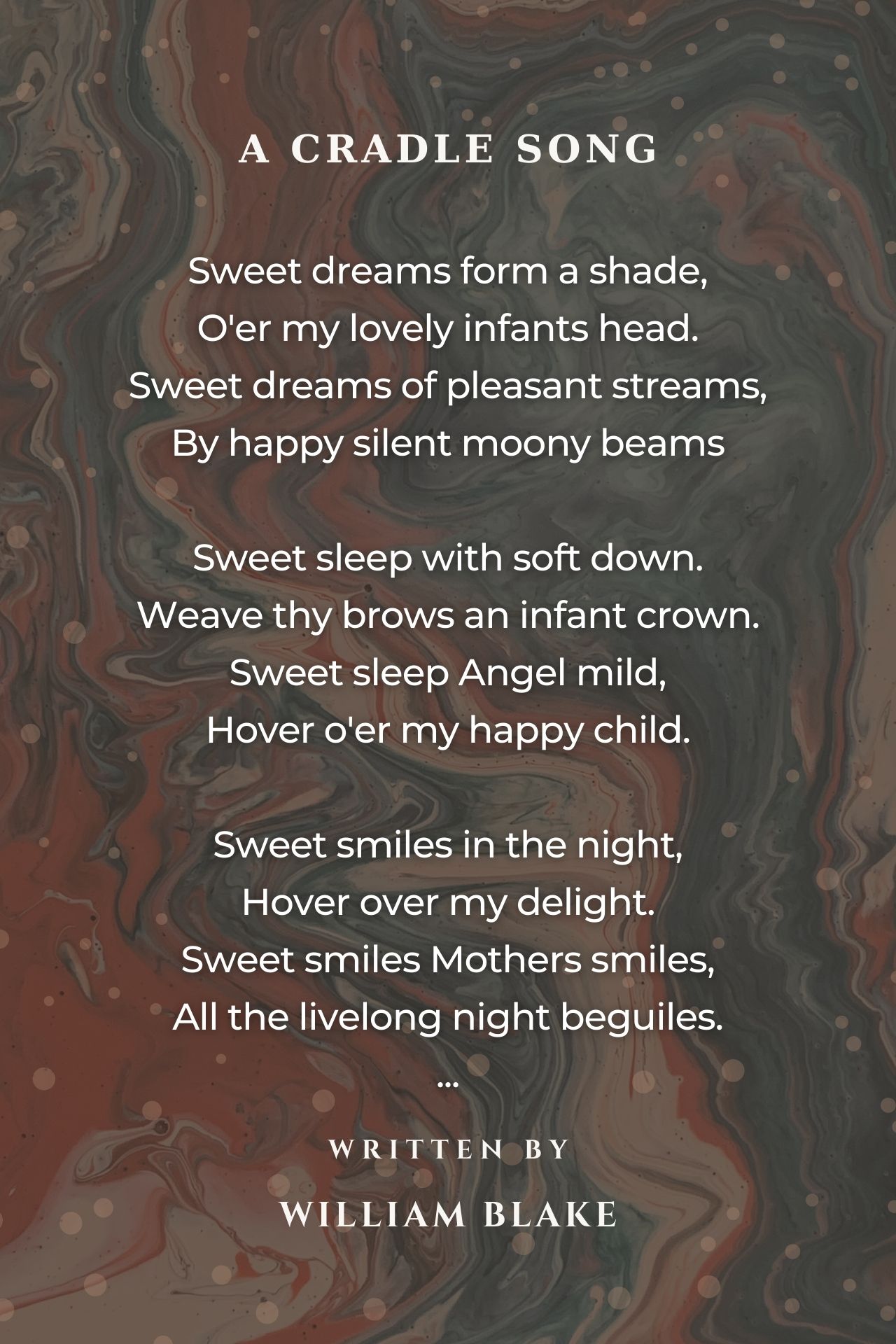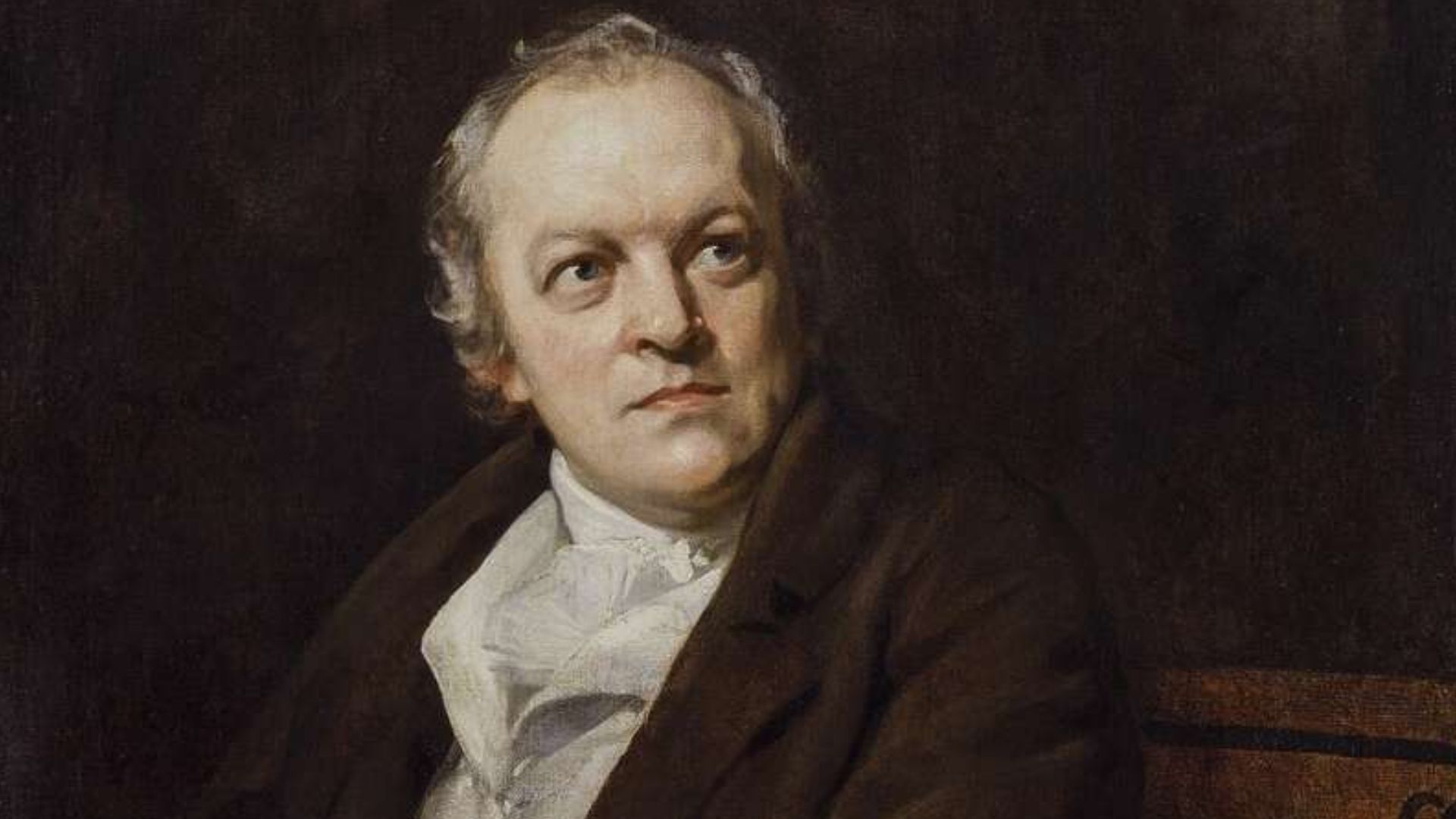A Cradle Song Poem by William Blake
A Cradle Song
Sweet dreams form a shade,
O'er my lovely infants head.
Sweet dreams of pleasant streams,
By happy silent moony beams
Sweet sleep with soft down.
Weave thy brows an infant crown.
Sweet sleep Angel mild,
Hover o'er my happy child.
Sweet smiles in the night,
Hover over my delight.
Sweet smiles Mothers smiles,
All the livelong night beguiles.
Sweet moans, dovelike sighs,
Chase not slumber from thy eyes,
Sweet moans, sweeter smiles,
All the dovelike moans beguiles.
Sleep sleep happy child,
All creation slept and smil'd.
Sleep sleep, happy sleep.
While o'er thee thy mother weep
Sweet babe in thy face,
Holy image I can trace.
Sweet babe once like thee.
Thy maker lay and wept for me
Wept for me for thee for all,
When he was an infant small.
Thou his image ever see.
Heavenly face that smiles on thee,
Smiles on thee on me on all,
Who became an infant small,
Infant smiles are His own smiles,
Heaven & earth to peace beguiles.

Sleeping beauty smiles by the grief of the mother like the smiling people under the care of crying God! Wonderful!
This poem is a reminder of why we say: AWWW, LOOK AT THAT CUTE LITTLE BABY! And we were that baby.
Revisiting this poem makes me very happy and I can feel and understand Blake's admiration for babies
All eight Quatrains are so delightfully worded, it's heaven to read William Blake's poem
Congratulations being chosen as The Classic Poem Of The Day. Most deserving poem.
TWO: the human spirit and the divine. He is also known for his vivid and imaginative visual art, which often depicts scenes from his own poetry.
Important lines from his Bio I cite here: Blake's poetry is known for its spiritual and mystical themes, and his work often explores the relationship between
This poem has not been translated into any other language yet.
I would like to translate this poem
‘A Cradle Song’ by William Blake is a poem about universal love for babies. The innocence Blake believed all children possessed at this age, and this love of innocence, moves from the love of Mother’s for their children, into God’s love for all babies given from Heaven; expressed as ‘Infant smiles are His own smiles, /Heaven & earth to peace beguiles.’ Babies smiles are the smile of God and enchant Heaven and earth with an ability to attract and maintain attention with a feeling of peace surrounding their sweet angelic sleep. The lines ‘Weave thy brows an infant crown./Sweet sleep Angel mild, /Hover o'er my happy child’ reminds of the birth of a king recognized as such by three wise men, who give gifts appropriate to a king. ‘Hover over my delight’ extends imagery of sleep, love, especially the love of ‘Mothers’ and angels, watching over a sleeping child with repetition of the word ‘Hover’. All healthy blessed babies have ‘Sweet moans, dovelike sighs, ... All the dovelike moans’ yet the line ‘All creation slept and smil'd.’ Firmly reminds us of Blake’s belief that God was once born as flesh in the person of Jesus Christ. All babies in a cradle are spoken of with ‘Sweet babe in thy face, /Holy image I can trace’ but again Blake specifically references Jesus continuing with ‘Sweet babe once like thee. /Thy maker lay and wept for me’. Blake boldly confirms Christian belief that Christ was born for all of us, all people across all history before and after him with, ‘Wept for me for thee for all, /When he was an infant small.’ Through one birth this ‘Heavenly face that smiles on thee, /Smiles on thee on me on all, /Who became an infant small, beautifully expresses God’s love for all his creation, all humanity. For God so loved that world that he was willing to give his only begotten son is a theme running through this poem.